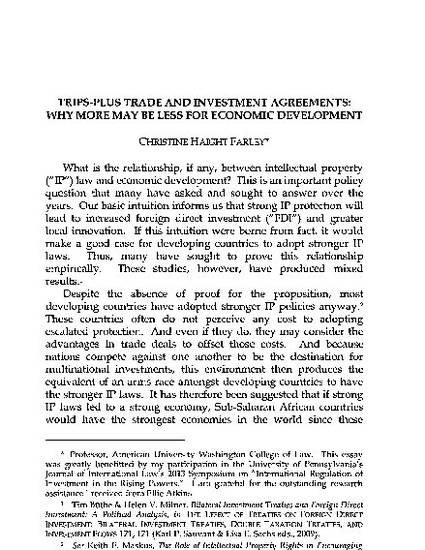
Article
TRIPS-Plus Trade and Investment Agreements: Why More May Be Less for Economic Development
University of Pennsylvania Journal of International Law
(2014)
Abstract
Conventional wisdom -- but not empirical research -- maintains that strong intellectual property (“IP”) rights trigger not only foreign direct investment, but also local innovation. Thus investors seek, and developing countries compete to offer, the highest levels of IP protections. But evaluating the level of IP protection in any given country has become increasingly complex. A proliferation of bilateral agreements, such as free trade agreements (“FTAs”) and bilateral investment treaties (“BITs”), intended to enhance the minimum standards set forth in The Agreement on Trade Related Aspects of Intellectual Property Rights (“TRIPS”), have created uncertainty about precisely what IP protections are available. Chile, for instance, is party to over one hundred IP agreements. By successively increasing the quantity and complexity of IP standards make a host state’s legal framework unknowable and thus highly unpredictable. Moreover, BITs permit investors to claim the “indirect expropriation” of their IP due to unsatisfactory IP protection. Investment arbitrators must then evaluate domestic laws for how they define the availability, validity, and scope of IP rights -- difficult substantive questions of IP law likely beyond the competence of investment tribunals. Such uncertainty over legal rights is never conducive to investment.
Keywords
- intellectual property,
- IP,
- trade,
- TRIPS,
- FTAs,
- BITs,
- investment,
- expropriation,
- trademark,
- developing economy
Disciplines
Publication Date
2014
Citation Information
Farley, Christine Haight, Trips-Plus Trade and Investment Agreements: Why More May Be Less for Economic Development (2014). 35 University of Pennsylvania Journal of International Law 1061 (2014).
